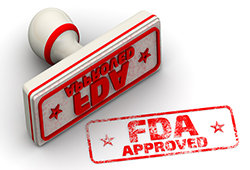 On September 10, 2021, Janet Woodcock, the acting FDA Commissioner of Food and Drugs at the FDA, sent a letter to Andrew Hirshfield, Under Secretary of Commerce for Intellectual Property and Director of the United States Patent and Trademark Office (USPTO) “pursuant to Executive Order 14036, and in the hope of further developing the [FDA’s] engagement with the [USPTO].”
On September 10, 2021, Janet Woodcock, the acting FDA Commissioner of Food and Drugs at the FDA, sent a letter to Andrew Hirshfield, Under Secretary of Commerce for Intellectual Property and Director of the United States Patent and Trademark Office (USPTO) “pursuant to Executive Order 14036, and in the hope of further developing the [FDA’s] engagement with the [USPTO].”
Executive Order 14036 was issued by President Biden on July 9, 2021 and focused on promoting competition in the American economy, including with respect to pharmaceuticals. Broadly, it directs “(a) The heads of all agencies [to] consider using their authorities to further the policies set forth in section 1 of this order, with particular attention to: … (iii) unfair anticompetitive conduct or agreements in the prescription drug industries, such as agreements to delay the market entry of generic drugs or biosimilars; …”
With respect to drug pricing, the Executive Order states “(p) The Secretary of Health and Human Services shall: … (vi) to help ensure that the patent system, while incentivizing innovation, does not also unjustifiably delay generic drug and biosimilar competition beyond that reasonably contemplated by applicable law, not later than 45 days after the date of this order, through the Commissioner of Food and Drugs, write a letter to the Under Secretary of Commerce for Intellectual Property and Director of the United States Patent and Trademark Office enumerating and describing any relevant concerns of the FDA; …”
In fulfilling the obligations outlined in the Executive Order, and with the goal of “brining more drug competition to the market and addressing the high cost of medicines and improving access to affordable medicine,” Commissioner Woodcock’s letter outlined “FDA Concerns” and points of potential collaboration between the USPTO and the FDA.
Under the heading of “FDA Concerns”, Commissioner Woodcock flagged the following concerns:
- The use of continuation patent applications which “can allow companies to create ‘patent thickets’ by obtaining multiple patents on different aspects of the same product with a patent application.” In the view of the FDA, this practice can “increase[] litigation burden and potentially delay the approval of generics and the launch of generics and biosimilar and interchangeable biologic products.”
- The practice of filing patent applications on “post-approval” or “secondary” drug formulations or delivery systems, or new indications. In the view of the FDA, “brand sponsors often seek approval for [] changes [to an approved product] just as earlier patents on the drug product are expiring” and the post-approval patent applications “effectively extend[] protection against competition.”
Under the heading of “Suggestions and Questions”, Commissioner Woodcock outlined the following:
- Engagement between FDA and USPTO: The FDA could “facilitate examiners’ work by offering training on FDA’s public information and databases that may help USPTO locate pertinent references and determine whether particular documents constitute prior art to a claimed invention.” Further, the letter proposed “joint training [regarding] FDA and USPTO roles in determining a product’s eligibility for patent term extension.”
- Possible Misuse of the Patent System: The FDA “would be interested in learning USPTO’s perspective on [brand use of the patent continuation process to create patent thickets, product hopping, and evergreening] and whether it is considering means of limiting such practices.”
- Adequate Time and Resources for PTO Examiner: The FDA “would be interested in USPTO’s views on whether additional resources or increasing the time given to examiners for patents relating to sensitive and complex subject matter, such as pharmaceutical patents, would help ensure the right balance of rewarding innovation and facilitating competition.”
- The Patent Trial and Appeal Board (PTAB): The FDA “would be interested in data regarding the impact of PGR and IPR proceedings, if any, on Orange Book-listed patents and/or patents covering biological products. FDA would also be open to further discussing with USPTO how the PTAB framework might be optimized to support timely availability of generic drugs.”
